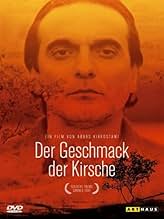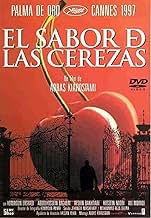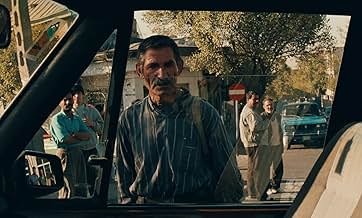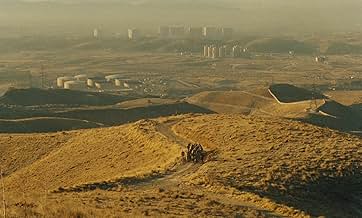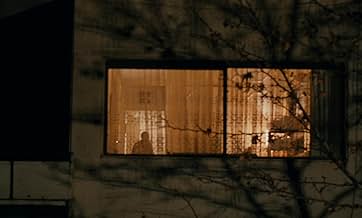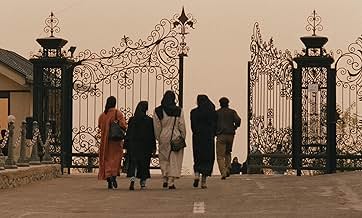एक ईरानी व्यक्ति ट्रक चलाते हुए किसी ऐसे व्यक्ति की तलाश में निकालता है जो उससके आत्महत्या करने के बाद उसे चुपचाप चेरी के पेड़ के नीचे दफना दे.एक ईरानी व्यक्ति ट्रक चलाते हुए किसी ऐसे व्यक्ति की तलाश में निकालता है जो उससके आत्महत्या करने के बाद उसे चुपचाप चेरी के पेड़ के नीचे दफना दे.एक ईरानी व्यक्ति ट्रक चलाते हुए किसी ऐसे व्यक्ति की तलाश में निकालता है जो उससके आत्महत्या करने के बाद उसे चुपचाप चेरी के पेड़ के नीचे दफना दे.
- निर्देशक
- लेखक
- स्टार
- पुरस्कार
- 3 जीत और कुल 5 नामांकन
फ़ीचर्ड समीक्षाएं
worried that, as a filmmaker, Kiarostami would be as inaccessible
as Godard in the 80s. I was pleasantly surprised by A TASTE OF
CHERRY. It's a linear narrative, and the film's early ambiguity
concerning the driver's quest kept me guessing (I knew nothing
about this film going in, which was a real plus). The film's unusual
visual style, particularly the long unedited takes, works surprisingly
well for this type of story. I can understand why traditional
American filmgoers would be bored to tears by A TASTE OF
CHERRY, but for fans of independent and foreign film, it's a
worthwhile investment of your time. It probably works better with
an older audience that can identify with the world-weary
characters.
From the beginning to the end, Kiarostami gives us a complex script of characters that we come into contact with, and as we learn about each one, we learn more about the idea of life. What makes the film very interesting for a Western viewer is that I find closer to Kiarostami's Iran after each of his films that I watch, and become more informed to it. We learn intimate details about the lives of several Iranians.
Throughout the film I found that, although like many of his films it was quite slow-paced, it contained the extraordinarily rich dialog that is expected of a Kiarostami film. His films advance through their rich dialog while using the dusty Iranian landscape as their backdrop. I found a lot of the cinematography to be terrific, viewing the city from a distance and looking into the dusty foot-hills on the outskirts of Tehran. It is more than poetic to see a man at the end of his rope searching through the dust and faces of Tehran's poor laborers for answers about life and death. In many ways, the film is a large metaphor for the human state of affairs.
The film culminates very well, and we all eventually find our own taste of cherry in the film. I always feel as if Kiarostami's films are a very philosophical experience, and are quite personal. In this sense, Kiarostami's films are amongst the best that I have seen.
However, they are undoubtedly slower paced than other films, and they require the viewer to detach himself from any western stereotypes that he has about film. This would not be a good film for somebody expecting action or a typical Western film, but rather, this would be a film that I would recommend only to those who are in the mood for an insightful, philosophical film that shows an alternative view of life. Overall, it was an emotionally powerful film that will stick out in my memory as all Kiarostami films do.
Suicide, in itself, is a ready and obvious turn-off for many viewers, probably. And coupled with the apparent treacle-like pace of the narrative and the repetitive scenes of a lone man, Badii (Homayoun Ershadi), driving in and around hills outside Tehran, this story gives a whole new dimension to the idea of going over the same ground, again and again, to prove a point. And all the while we, as viewer, are inside the auto for most of this movie, up close and very personal....
But to avoid seeing this movie would be a big mistake, in my opinion.
I say that simply because the idea of suicide has probably occurred to most people, including myself, at some time in their lives. Whether that idea was part of Kiarostami's motivation for making this movie, we will never know, of course. I dare say it occurred to him, though.
At the first frame, we're in Baddii's well-worn Range Rover as he drives, his face set, his gaze wandering here and there, searching for a likely assistant for his plan to kill himself. In sequence, he stops a variety of men - a seminarian, a young soldier, a security guard; each man and Badii converse about his need to have somebody help him to suicide, Badii describing what a helper must do. Each time, Baddi has no success until, with a blindingly quick jump-cut, an old man, Bagheri (Abdolrahman Bagheri) is in the car, a helper who finally agrees to abide by Badii's wishes.
So, after taking Bagheri to close where he lives, Badii drives off, content that he has secured a deal; rapidly, however, he drives back in a fluster, as doubts creep into his mind. Frantically, he walks around the area until he finds the old man Bagheri to seek further assurance he will indeed help Badii next morning. Somewhat annoyed, the old man again gives his solemn promise. And stalks off.
Slowly then, Badii returns to his home/apartment, makes his final preparations, makes a point of turning off all the lights as he leaves, locks the door, leaves his car, and then takes a taxi back to the cherry tree, he had previously selected, at which he will terminate his life during the night, and as thunderstorms - a much-overused trope perhaps - begin.
It is there, then, that I will leave you to find out why Bagheri decided to help, and about Badii's fate that night. And about an absolutely unexpected ending.
It's a bleak story, but one that is played out in too many ways by thousands every day, more or less in every country on the planet, probably. Perhaps then, Kiarostami is urging us to think upon that more often as we all traverse our own daily ups and downs - and especially in relation to those who are nearest. Once seen, this is not a movie to forget.
Recommended for all, except toddlers obviously. Give it eight out of ten.
At least not in the traditional sense. If you watch the behind the scenes and making of stuff, you'll know that the movie had a premise and pretty much everything else was "improvised" or taken from rehearsals and conversations with real people. Driving around trying to cast someone ... it's almost meta considering what the movie is about. And then the political background in Iran and what filmmakers were allowed and not allowed to do ... there are quite a few layers here ... which you either acknowledge and take into account or dismiss and just view this is as annoying/boring. Which is a fair thing to say if you feel that way.
It is also fair for others to feel this is a masterpiece and the best thing to happen to movies since ... ok that may be an exaggeration. Still the somber and low key attitude of our main character/actor and what he tries to achieve on his (last?) journey is quite something ... the pacing is as slow as you'd expect it ... and as with many low budget films of this nature you are able to interpret many things into the story and the actions of the characters ... or not.
There are critics who call this kind of untouched-by-art realism genius, who say that Kiarostami is making us think, reconsider the very nature of cinema, and so on. To my mind, the message of the film-- the taste of cherry makes life worth living-- is no more or less profound than, say, Woody Allen rattling off a few of the things that make life worth living in Manhattan, or the epiphany the kid in American Beauty gets from a plastic bag. (Likewise the message that it's all only a movie. Never woulda guessed.) And critics who find such a message shallow in a piece of slick entertainment, but deep when it's in a deliberately unentertaining art film, need to reexamine their critical principles, or lighten up a little-- or at least go see again the work of real art Kiarostami alludes to in his title, Wild Strawberries, which has more depth of characterization and emotional richness in any five minutes than this manages to scrounge up in an hour and a half.
क्या आपको पता है
- ट्रिवियाThe film was shot without a proper script, relying on improvisations.
- गूफ़In the opening scene, as Mr. Badhi is driving past laborers looking for work, the same middle-aged white haired man, wearing a checkered sweater vest, is seen twice.
- भाव
Mr. Bagheri: If you look at the four seasons, each season brings fruit. In summer, there's fruit, in autumn, too. Winter brings different fruit and spring, too. No mother can fill her fridge with such a variety of fruit for her children. No mother can do as much for her children as God does for His creatures. You want to refuse all that? You want to give it all up? You want to give up the taste of cherries?
- कनेक्शनFeatured in Especial Cannes: 50 Anos de Festival (1997)
टॉप पसंद
- How long is Taste of Cherry?Alexa द्वारा संचालित
विवरण
- रिलीज़ की तारीख़
- कंट्री ऑफ़ ओरिजिन
- आधिकारिक साइटें
- भाषाएं
- इस रूप में भी जाना जाता है
- Taste of Cherry
- फ़िल्माने की जगहें
- उत्पादन कंपनियां
- IMDbPro पर और कंपनी क्रेडिट देखें
बॉक्स ऑफ़िस
- दुनिया भर में सकल
- $12,187


